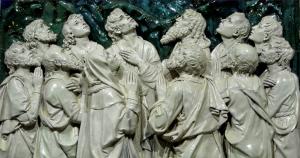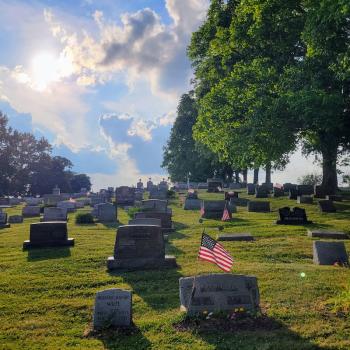I tell you the truth: it is to your advantage that I go away, for if I do not go away, the Advocate will not come to you; but if I go, I will send him to you. And when he comes, he will prove the world [cosmos] wrong about sin and righteousness and judgment: about sin, because they do not believe in [have faith in, entrust themselves to] me; about righteousness [what God deems just], because I am going to the Father and you will see me no longer; about judgment, because the ruler of this world has been condemned. – John 16:7-11 (NRSVCE)

Without Jesus’s promises such as this, read in the liturgy two days before Ascension Thursday, the departure of His incarnate form from this earth would seem to be an unmitigated loss to this world. Sure, He also promises to return and bring us to Heaven in the consummate wedding of the Lamb, but what should sustain us until that unknown day? Evil still holds strong sway over this world—this fact cannot be denied or diminished. If we have true faith, why not oppose and end the sea of troubles, and sleep until the Second Coming? Is it only that the Everlasting has fixed His canon against self-slaughter? Or might the Incarnation and Resurrection transmit some joy through participation in God’s family of love in the here and now, despite the ongoing presence of opposing forces?
From His conception until His ascension, Jesus was bound by time and space. By sending us the Holy Spirit in His stead, God makes His Presence available to all people, in every place and time. And this Presence is not just a spiritual notion or sense. All of us need to experience an Incarnate God in the here and now, not only hope for Him in the future. So the Holy Spirit “incarnates” His Presence in the present in several different ways.
The Sacraments
The gift of the Spirit ushers in a new era in the ‘dispensation of the mystery,’ the age of the Church, during which Christ manifests, makes present, and communicates his work of salvation through the liturgy of his Church, ‘until he comes.’ In this age of the Church Christ now… acts through the sacraments in what the common Tradition of the East and West calls ‘the sacramental economy’. (CCC 1076)
The Sacraments, especially the Eucharist, are the most formally obvious means by which Jesus’s presence is incarnated through the power of the Holy Spirit. At least Catholics would place these first when thinking of God’s incarnate Presence with us today; Protestants of certain traditions may place these further down the list or even consider them merely a subset of the fellowship of believers discussed next.
The wonder of the Sacraments is that they make God’s works of grace truly tangible, regardless of the quality of the minister administering them or the lay community that may or may not surround the recipient of the Sacraments. The Church promises us this mysterious efficacy in condemning Donatism. I do not need to know anything about a particular priest or parish to know that I will receive the Body and Blood of Christ by participating in Mass there (no matter how much the homily may disappoint or even enrage). I do not need to investigate the particular beliefs of the “independent” Presbyterian pastor who baptized me to know that I truly entered into God’s family and received the Spirit of Adoption when he sprinkled my forehead as a newborn.
The Sacraments may be fail-safes theologically, but alone they often fail us psychologically. We are created to be relational creatures in addition to fleshy ones. The tangible things of water and wine and bread may prove cold comfort for receivers looking for a spiritual and emotional sense of belonging to this blessed family, and finding only figures and forms and promises that they signify something more. This something more may not bear any visible fruit among other members of the Church close at hand, so it requires a mighty leap of faith to keep believing that this “something” is a real and fruitful thing at all.
The Fellowship and Charity of Believers
Where two or three are gathered in my name, I am there among them. (Mt 18:20)
They devoted themselves to the apostles’ teaching and fellowship, to the breaking of bread and the prayers. Awe came upon everyone, because many wonders and signs were being done by the apostles. All who believed were together and had all things in common; they would sell their possessions and goods and distribute the proceeds to all, as any had need. Day by day, as they spent much time together in the temple, they broke bread at home and ate their food with glad and generous hearts, praising God and having the goodwill of all the people. And day by day the Lord added to their number those who were being saved. (Acts 2:42-47)
Let us consider how to provoke one another to love and good deeds, not neglecting to meet together, as is the habit of some, but encouraging one another. (Heb 10:24-25)
The gifts he gave were that some would be apostles, some prophets, some evangelists, some pastors and teachers, to equip the saints for the work of ministry, for building up the body of Christ, until all of us come to the unity of the faith and of the knowledge of the Son of God, to maturity, to the measure of the full stature of Christ. (Eph 4:11-13)
The New Testament testifies repeatedly that Christ is present in the fellowship of believers, and not only when they meet for liturgical celebrations. When together they prophesy, pray, and do good works, there Christ is among them, manifesting supernatural love so that all may come to believe. It is the Holy Spirit that knits them together, giving them suitable gifts to become Christ’s active presence in the world.
Some Christian communities place much more emphasis on the non-liturgical fellowship of believers than Catholic parishes typically do. Not only Protestants, but Catholic religious orders make Christian fellowship of deed and prayer a constant way of life. Also certain “apostolic movements,” “intentional communities,” and the like strive after a more active Christian fellowship without abandoning Catholic liturgy or making vows of celibacy and obedience to a religious superior. In any case, the New Testament makes more frequent and clear reference to the shared life of prayer and service as constituting the Body of Christ than it does celebration of formalized Sacraments. And speaking of Scripture…















